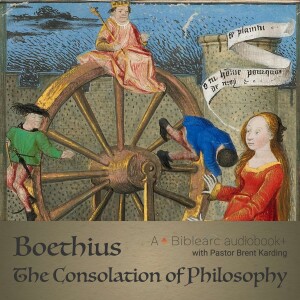
Chapter Summary
The dirtiness of shameful actions and the glory of virtuous actions shows that good people are always rewarded, and wicked people are always punished. This is because a reward is a natural result of the purpose of an action. If a good man becomes good, he must have the good—that is, happiness! And no one can take this reward from him, for only those who cease to be good lose it. Also, those who are happy partake in godhood, which reward cannot be diminished or destroyed.
The wicked must suffer a converse punishment: wickedness itself. Since wicked people depart from the good and lose their own unity, they thus destroy their own personhood. They become subhuman, animals—far from being gods.
About The Consolation of Philosophy
Written in the 6th-century from a prison cell as the author awaits execution for a crime he did not commit, The Consolation of Philosophy is a dialogue between Boethius and a mysterious woman—Lady Philosophy—who helps him rediscover wisdom and virtue.
Subscribe now and begin walking the path of wisdom with us.
 Want to go deeper?
Want to go deeper?
You’re invited to join the companion course that dives deep into each of the five books. There, we’ll explore each chapter, with guided readings, discussion prompts, and study tools to enrich your journey. Enroll today.
No comments yet. Be the first to say something!